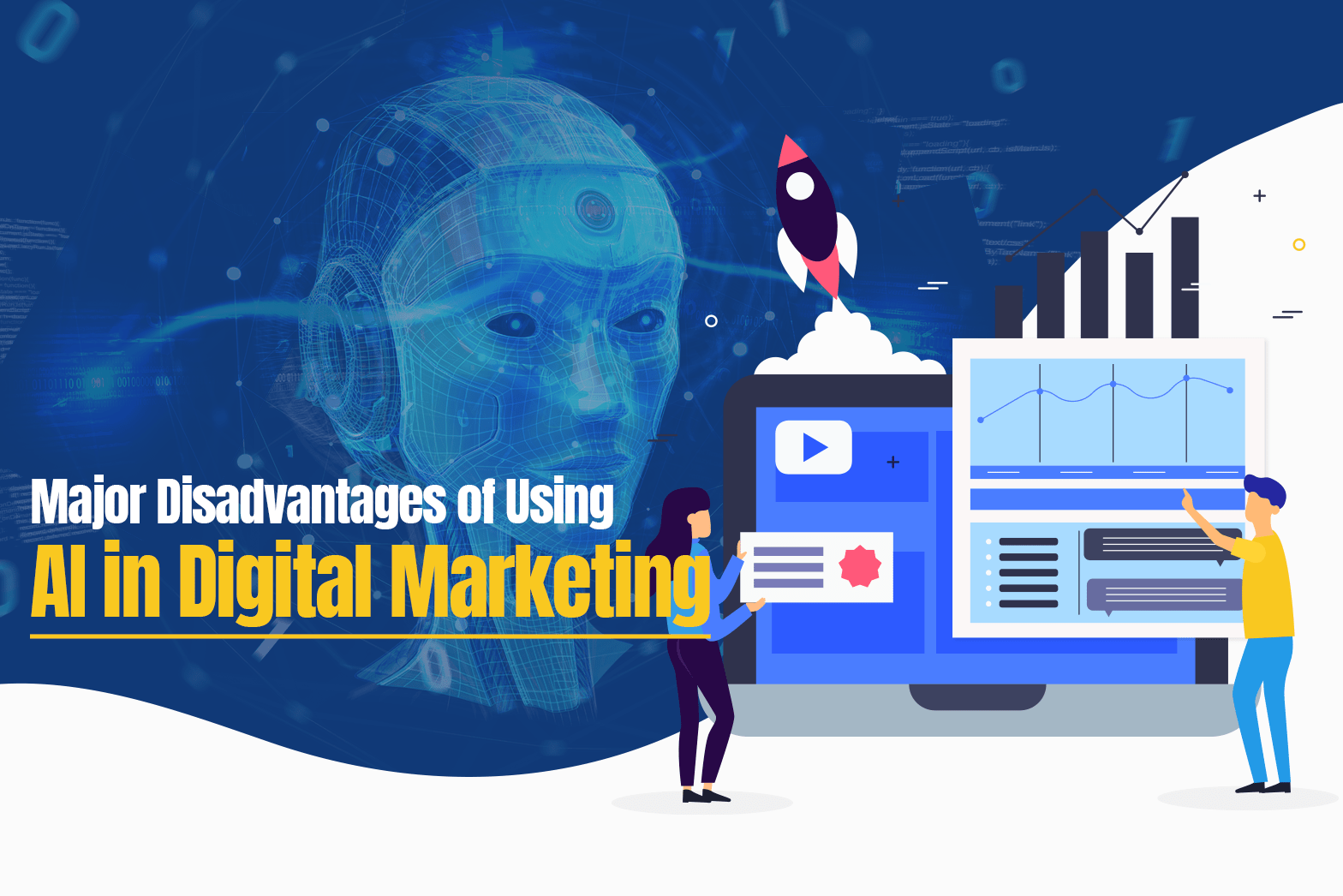Major Disadvantages of Using AI in Digital Marketing

What is AI and How Does it Impact Digital Marketing Strategies?
Artificial intelligence (AI) pertains to the capacity of machines to carry out activities that traditionally necessitate human intelligence, such as acquiring knowledge, finding solutions to problems, and making decisions. In the context of digital marketing strategies, AI can be used to analyze data, personalize messaging, and optimize campaigns. It can also help businesses automate repetitive tasks and improve customer experiences. The impact of AI on digital marketing strategies is significant, as it can lead to more efficient and effective marketing efforts, increased ROI, and improved customer satisfaction.
Major Disadvantages of Using AI in Digital Marketing
Artificial Intelligence (AI) has revolutionized the world of digital marketing in recent years. With its ability to analyze large amounts of data, automate tasks, and personalize experiences, AI has become an indispensable tool for marketers. However, as useful as AI can be, it also has some significant disadvantages that need to be considered before implementing it in your digital marketing strategies.
Lack of Emotional Intelligence
One of the primary disadvantages of using AI in digital marketing is its lack of emotional intelligence. AI is an algorithm-based system that cannot understand human emotions or reactions. Therefore, it may fail to recognize the emotional context of a situation that could have a significant impact on a customer’s decision-making process. This can lead to AI-driven marketing campaigns falling flat or even backfiring.
Dependence on Data
AI is data-driven, which means it relies on large amounts of data to make decisions and predictions. However, data is not always accurate, and AI can only work with the data it has been trained on. This can result in biased or incomplete insights, leading to incorrect conclusions and ineffective marketing strategies.
Lack of Creativity
While AI can automate many tasks and optimize processes, it has limited creativity. AI is only as creative as the data it has been trained on, and it cannot come up with entirely new ideas or strategies on its own. Creative marketing requires human intuition, imagination, and experience, which AI lacks.
Lack of Personalization
AI is excellent at personalization, but it can also fall short in some areas. For example, AI may not be able to understand the nuances of a customer’s preferences or interests, leading to irrelevant or even inappropriate recommendations. Additionally, some customers may feel uncomfortable with the level of personalization that AI can offer, leading to a lack of trust in the brand.
Cost and Complexity
Implementing AI in digital marketing can be costly and complex. Companies need to invest in the necessary technology and infrastructure, as well as hire skilled professionals to manage and interpret the data. Additionally, AI systems require ongoing maintenance and updates to remain effective, which can add to the overall cost.
Ethical Concerns
AI raises ethical concerns in digital marketing, particularly when it comes to data privacy and security. Companies must ensure that customer data is collected and used ethically and legally, with proper consent and transparency. Additionally, AI-driven marketing can reinforce existing biases and stereotypes, leading to discrimination and exclusion.
How to Mitigate the Risks Associated with Implementing AI in Digital Marketing
Here are some ways to mitigate the risks associated with implementing AI in digital marketing:
> Start small and test regularly to identify potential issues early on.
> Focus on transparency and privacy to build trust with customers and avoid legal issues.
> Use high-quality data and ensure it is properly labelled and structured to avoid bias and inaccuracies.
> Train and educate your team to effectively use and understand AI tools and results.
> Have a plan in place for handling errors or unexpected results.
> Continuously monitor and update your AI models to ensure they are performing effectively and ethically.
The Pros & Cons Of Leveraging AI For Your Digital Marketing Efforts
Pros:
> AI can help automate routine tasks, saving time and increasing efficiency.
> AI can analyze large amounts of data quickly, providing valuable insights for marketing strategies.
> AI can personalize marketing efforts based on individual customer preferences and behaviours.
> AI can improve targeting and segmentation, increasing the effectiveness of marketing campaigns.
> AI can enhance the customer experience by providing personalized recommendations and support.
Cons:
> AI may not always provide accurate predictions or insights, leading to flawed decision-making.
> AI can be expensive to implement and maintain, especially for smaller businesses.
> AI may not fully understand the nuances of human behaviour and may not be able to replicate human creativity.
> AI may raise ethical concerns around data privacy and the potential misuse of customer information.
> AI may not be able to fully replace human interactions and relationships with customers.
In conclusion, while AI has many benefits for digital marketing, it also has significant disadvantages that need to be considered. Companies must weigh the advantages and disadvantages carefully before implementing AI in their marketing strategies. They must also ensure that ethical and legal considerations are taken into account to avoid negative consequences for both customers and the brand. The practice of digital marketing is a tried-and-true method for brands to effectively connect with their target audience and promote their products or services. If you’re seeking assistance in achieving your business and marketing objectives, look no further than eWoke – The Leading Digital Marketing Agency in Kochi, Kerala. Our team of experts is eager to help you discover how we can best support your efforts.
Recent Posts
GEO Vs AEO Vs SEO Comparison Guide – Revolution of AI Marketers in 2025
We’re entering a new era where AI and human curiosity come together and if your business isn’t ready, you could fall behi...
WordPress Plugin All-in-One WP Migration Security Bypass (2.0.4)
The All-in-One WP Migration plugin for WordPress has a security bypass vulnerability that could let attackers perform restric...
FAQ: All About the New Google “Hummingbird” Algorithm
Google has a new way of sorting information when searching for something. This system is called “Hummingbird.” Here's wha...
Meta new update to increase lead quality
Are you running Facebook Lead Ads but unhappy with the quality of leads you're getting? A key setting and a recent update cou...
